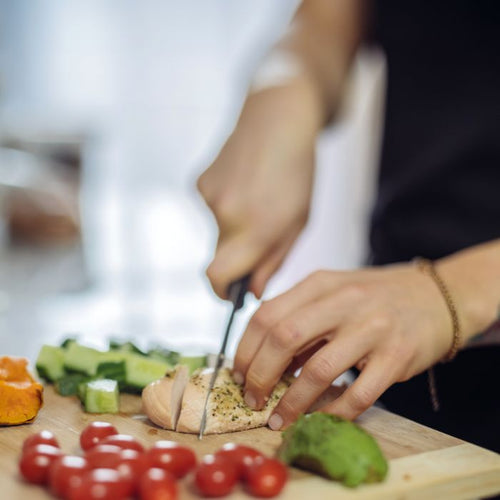Vegan And Vegetarian Meal Prepping Tips
Vegan vs. Vegetarian: What's the Difference?
Before diving into meal prepping, let's clarify the difference between vegan and vegetarian diets. 
A vegetarian diet excludes meat, poultry, and seafood, while a vegan diet goes a step further and also eliminates dairy products, eggs, and any other animal-derived ingredients.
Both dietary choices can be healthy, and meal prepping can help you stay organised and enjoy delicious meals!
How to Do Vegan and Vegetarian Meal Prep
Make a Plan
First things first, create a meal plan for the week ahead. Jot down your meals and snacks for each day, and make sure to balance nutrients by including various protein sources, whole grains, fruits, and vegetables.
Related: Meal Prep Tips Every Fitness Enthusiast Should Know
Round Up a Few Recipe Ideas
Browse online or use a recipe book to find new vegan and vegetarian meal ideas.
Keep track of your favourites, and don't be afraid to try something new!
Remember, variety is the spice of life.
Head to the Supermarket
Armed with your meal plan and recipes, create a shopping list and head to the supermarket.
Stick to your list to avoid impulsive buys, and prioritise fresh, seasonal produce for better taste and lower costs.
Related: How to Create a Meal Prep Schedule That Fits Your Busy Work Schedule
Get the Right Kitchen Gear
Having the right tools can make meal prepping a breeze. Some essentials include a sharp knife, chopping board, measuring cups, and a set of reusable containers for storage.
A slow cooker, blender, or food processor can be a game-changer, too!
Prepare Whole Grains and Keep Them in the Fridge
Cook a batch of whole grains like quinoa, brown rice, or barley, and store them in the fridge.
They're an excellent base for salads, stir-fries, or grain bowls and can save you time during the week.
Related: The Benefits Of Zero Waste Meal Prepping
Don't Be Afraid of Frozen Food
Frozen fruits, vegetables, and plant-based protein options are often more affordable and can be just as nutritious as fresh.
Plus, they don't spoil as quickly, reducing food waste.
Break Out the Slow Cooker
A slow cooker can be a meal prepper's best friend. Whip up hearty vegan and vegetarian soups, stews, and chillies, and let the slow cooker do its magic while you go about your day.
Pack in Protein with Canned Beans
Beans, chickpeas, and lentils are fantastic plant-based protein sources.
Canned options are convenient and have a long shelf life. Rinse and drain them before adding to salads, wraps, or other dishes.
Eat More Snacks
Ensure you always have a selection of healthy snacks on hand, like cut-up veggies, fruit, or a handful of nuts.
Snacking throughout the day can prevent overeating at mealtime and keep your energy levels up.
Make Breakfast a Breeze, Too
Don't forget to prep your breakfasts!
Overnight oats, chia seed pudding, or a batch of homemade granola are all easy to make ahead of time and provide a nutritious start to your day.
When in Doubt: Peanut Butter
Peanut butter is a versatile, nutrient-rich staple for vegan and vegetarian diets.
Spread it on toast, use it in smoothies, or make a sauce for noodles or stir-fries.
The possibilities are endless!
Rethink Leftovers
Don't toss your leftovers; instead, reimagine them into new meals.
Use leftover veggies in a frittata, or turn yesterday's grain salad into a tasty wrap.
Get creative and reduce food waste!
Conclusion
Vegan and vegetarian meal prepping can be simple and enjoyable with the right approach.
Keep things organised, embrace variety, and make use of leftovers.
Soon, you'll be enjoying delicious, healthy meals without the daily stress of planning and cooking!
FAQs
Is meal prepping suitable for all types of diets?
Yes, meal prepping can be adapted to fit various dietary preferences, including vegan, vegetarian, gluten-free, and more.
How long do prepped meals last in the fridge?
Most prepped meals last for 3-5 days in the fridge. Use airtight containers and store each component separately to maintain freshness.
Can I freeze meal-prepped food?
Yes, many meal-prepped dishes freeze well. Make sure to use freezer-safe containers and label them with the date and contents.
Do I need to track macros when meal prepping?
Macro tracking is not required, but it can be helpful for ensuring balanced nutrition. Tailor your approach based on your personal goals and preferences.
Is it more expensive to follow a vegan or vegetarian diet?
Not necessarily. Many plant-based protein sources like beans and lentils are affordable. Buying in-season produce and using frozen options can also help keep costs down.




